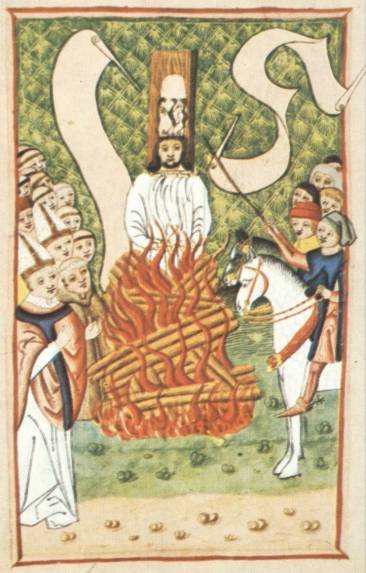Dekuji za tvou skvelou praci pro Lovce a milovniky historie.
6.7. 1415 Burning of Master Jan Hus
Categories: Personalities , Calendar
 On the border Jan Hus sang until the smoke choked him. The fateful moment occurred on July 6, 1415 in Constance.
On the border Jan Hus sang until the smoke choked him. The fateful moment occurred on July 6, 1415 in Constance.
In early June 1415, Hus was taken from the tower of Gottlieben, where he was replaced by the captured and deposed Pope John XXIII, to the cellars of the Franciscan monastery in Constance. He was given the promised public hearing in the refectory, the monastery dining room. Huss was transferred to it completely exhausted by illness and plagued by toothache, which in itself made it difficult for him to defend himself against ridicule.
Fearing for the preacher's fate, his friends begged Sigismund for help. "The king complied and sent his agents, Louis, the Falckrabbot of Rhineland, and Frederick, Purgrave of Nuremberg, to see that Hus was patiently heard. But instead he was slandered and attacked. In vain he defended himself against the attacks and tried to develop his arguments. Because of the utter confusion, the hearing was finally postponed until 7 June," writes Jan Bauer in his book, The Revolutionary Events of Czech History.
During the second hearing, fabricated accusations were heard against Hus, which he strongly denied. "God and my conscience are witnesses to me that I have done nothing of what is said against me," Hus declared. Cardinal d'Ailly replied that the court could not be guided by his conscience when testimonies are given which are supported by serious reasons. Then, at the conclusion of the hearing, he and Sigismund urged Hus to submit to the Council and confess his errors. If he failed to do so, he would be treated mercifully.
At the last public hearing, selected portions of Hus's writings were put on the agenda. The cardinal concluded by exclaiming that Huss was not only subverting the ecclesiastical state, but was attempting to overthrow the royal state. "Under these circumstances, Hus's fate had in fact already been decided," Bauer points out.
On the morning of July 6, 1415, the entire council gathered in the cathedral of Constance for mass. Only after it was over did they bring Jan Hus in shackles. The procurator of the council announced the conclusion of the trial, and Prelate Berthold de Wildungen read the 260 heretical articles of Wyclif and then the heretical articles of Hus. The latter began to protest loudly, but on the orders of Cardinal d'Ailly, he was silenced by the bishops. The sentence was prepared in two versions in case Huss recanted or persisted in his obstinacy and did not recant. When he firmly declared that he would not recant, the sentence of deprivation of the priesthood and the transfer of secular power was pronounced.
The bishops themselves cut off Huss's tonsure, the priestly baldness, with scissors, and a shameful paper cap was placed on his head with painted devils and the Latin inscription "this is the arch-priest". Then, at Sigismund's command, the bierce took possession of him, and, amid much curiosity, led him outside the city walls, where he was put on the executionand tied him to a stake deliberately placed on the horse scavenging ground and covered him with bundles of damp wood and straw. The executioner then set the pyre on fire and Huss began to sing, "O Christ, son of God, have mercy on me! Christ, son of God, born of a pure virgin!" - he wanted to finish saying, "Have mercy on me!" but the flame whipped him in the face. The smoke choked his speech, he lowered his head and - he died.
Jan Bauer: The Revolutionary Events of Czech History, Carl Herlosssohn, Bohemia from 1414-1424: Jan Hus, https://necyklopedie.org/
The article is included in categories:







